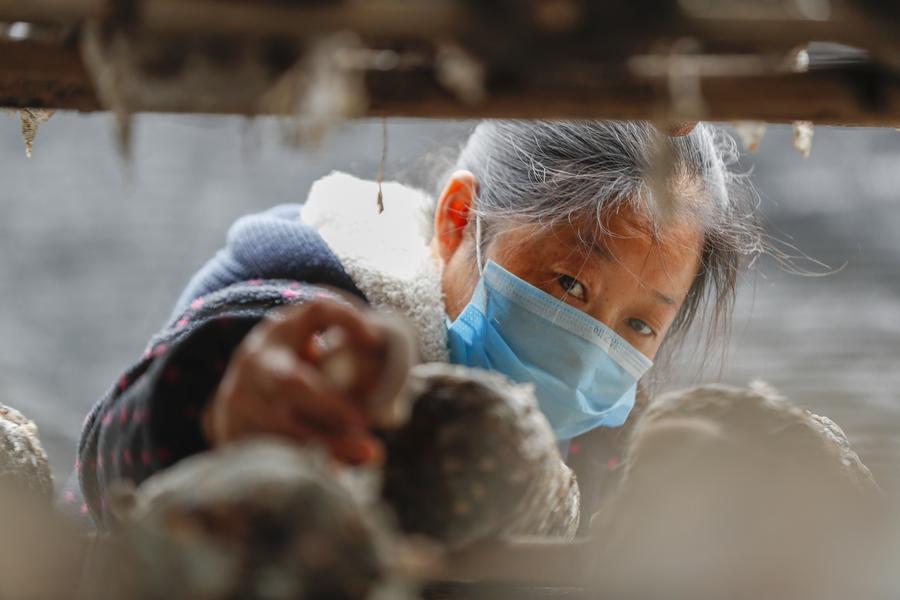A worker picks mushrooms at a poverty alleviation industrial base in Xiuqi Township of Chengkou County, southwest China's Chongqing, Feb. 24, 2020. (Photo by Huang Wei/Xinhua)
A small family workshop producing cured meat in southwest China grows into a factory earning 4 million yuan (about 563,000 U.S. dollars) a year, while idle farmhouses are transformed into magnetic homestays or coffee shops for tourists to enjoy. Such developments in China often stem from the efforts of village CEOs.
Village CEO, also referred to as agricultural manager, was included among 13 new professions published jointly by China's Ministry of Human Resources and Social Security, the State Administration for Market Regulation, and the National Bureau of Statistics in 2019.
Village CEOs serve as links between rural resources and the market. They use their skills to drive the rural collective economy to ensure efficient use of resources, thereby making sure rural people benefit from what they have, said Li Xiaoyun, chair professor of China Agricultural University, when addressing the opening ceremony of a village CEO training program.
Chengkou County in southwest China's Chongqing Municipality is blessed with rich tourism resources and known for its local specialties such as cured meat. Previously, some villages took steps to foster local industries, but their efforts often ended in failure due to a lack of management skills. Chengkou aimed to address this problem by seeking talents who knew market rules well.
To coordinate resources and develop effective industries, 190 rural collective economic organizations jointly set up the Dabashan rural collective economic organization management company in 2021.
This joint-stock company recruited He Shuqin as its general manager. Previously employed in a state-owned financial services institution focusing on rural areas, He Shuqin had rich financial knowledge and experience in assessing the feasibility of rural programs.
"Based on prior working experience, my team improved the assessment mechanism for rural investment feasibility. Programs should be assessed by experts before reaching investment decisions, to lower investment risks," He explained.
Li Wencheng, a Chengkou resident, ran a family workshop that made cured meat. In 2022, Li wanted to develop the workshop into a standardized factory with production lines for meat washing, curing, and packaging, but Li lacked the necessary finances to do so.
"Chengkou is famous nationwide for its cured meat, and in recent years China has placed much emphasis on developing local specialties. The assessment team felt optimistic about the prospects of a cured meat-making factory," said He, adding that the company had made equity investments totaling 300,000 yuan in the upgrade of Li's factory.
"As local specialty industries have seen robust development over the past years, we decided to ride the wave by strengthening and expanding this cured meat business. The factory now earns 4 million yuan a year," Li said.
Since its foundation, the Dabashan rural collective economic organization management company has made investments totaling 30 million yuan, bolstering more than 20 industry programs. It has delivered bonuses of nearly 900,000 yuan to rural collective economic organizations and stakeholders.
"It's more challenging to be a CEO in a village than in an enterprise," said He Bangfei, 50, who hails from Youyang Tujia and Miao Autonomous County in Chongqing and serves as a village CEO there. "A village CEO must not only manage villagers, but also handle interpersonal relationship well in such rural areas," he added.
He Bangfei left home when he was young and now owns four large furniture factories after years of struggling in Shenyang in northeast China's Liaoning Province. In 2021, He Bangfei's hometown of Hejiayan in Youyang set up a cooperative aimed at achieving prosperity for all. The cooperative gives every villager the chance to play a role in the planning, construction and operations of rural revitalization programs.
The cooperative needed a leader who not only had enterprise management experience, but who also knew the village well. He Bangfei was identified as a suitable candidate and answered the call of his hometown without hesitation.
He Bangfei and his team decided on a plan to transform idle farmhouses into libraries, coffee shops or convenience stores to boost tourism, and this meant that team members were required to communicate often with the villagers.
Once an elder villager hindered a program due to some misunderstandings. He Bangfei invited the elder villager to his home, and they spoke for several hours. He Bangfei grew up in Hejiayan, which meant that he understood the concerns of the local people there.
"Villagers have diverse ideas, and we need to direct their efforts towards one goal," said He Bangfei, adding that he assured the elder that all efforts were aimed at achieving success for the entire community. His long and careful explanation finally succeeded in convincing the elder villager not to resist the project.
Village CEOs can promote the effective application of rural resources and feature prominently in the rural revitalization of Youyang, said Qi Meiwen, Party secretary of Youyang, at a meeting on village CEO policies held in Kunming, southwest China's Yunnan Province, on March 15.
Qi added that village CEOs think from the angle of rural people and this enables them to better serve rural communities.
